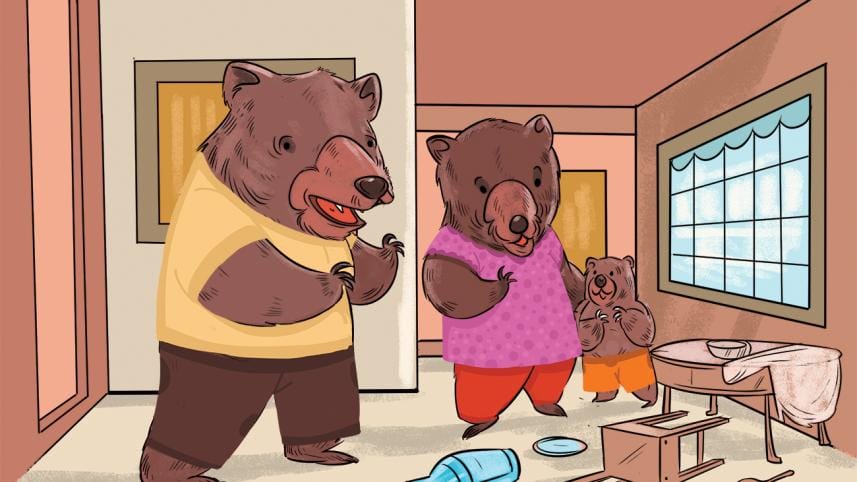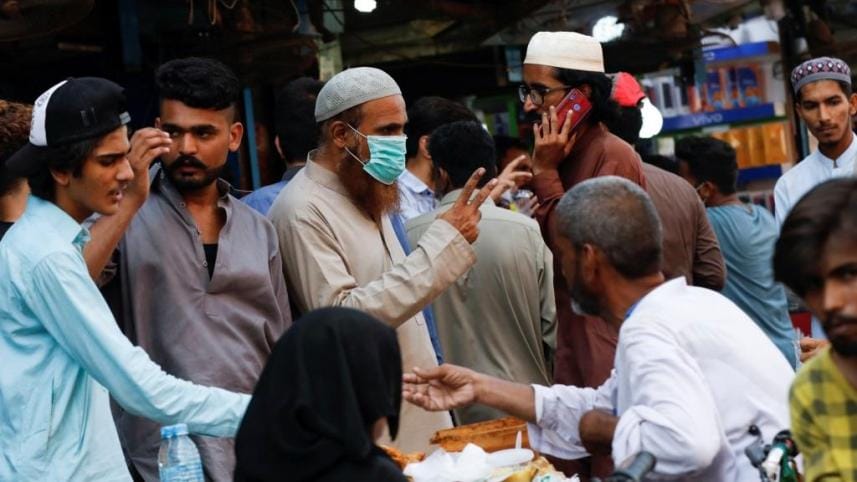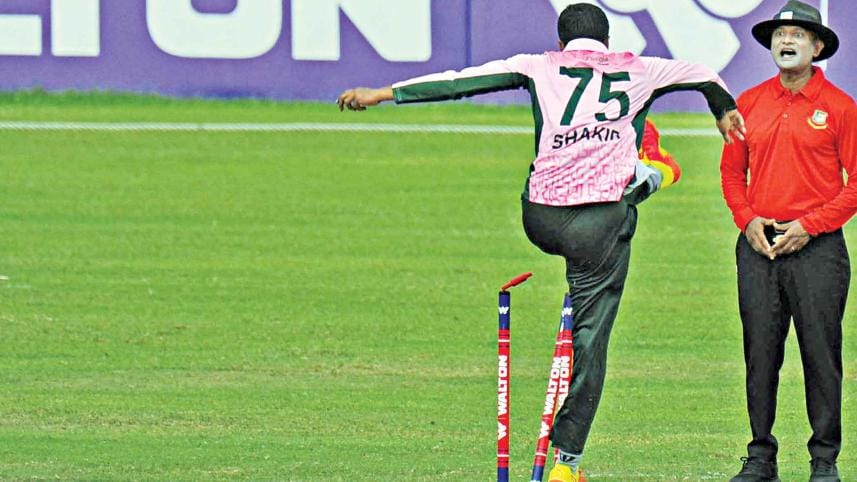The Break-In

They came home and found the backdoor open. Stan, who was the last one out, had forgotten to lock it. But there was no I told you so from Carla as she traipsed around to assess the damage, which wasn’t much—one smashed chair and a bed that looked slept in, both Junior’s. Also Junior’s, a bowl of porridge on the kitchen that was full when they left but was now licked clean. A steady boy of a year and a half, Junior took all this in calmly. He had what Carla called a quiet head. He’d gotten that from her.
Carla took big sniffs of the chair and bed as Stan frantically inventoried the house for things stolen.
“It was a girl,” she concluded when he came back (quickly, for theirs was a modest home).
“No way.”

“You should’ve smelled her as soon as we came in. Plus,” she held up a strand of hair that flashed golden in the late morning sun.
“Could’ve been coyotes, jackals,” Stan said.
“They wouldn’t dare. I’ve never known one to break The Hierarchy. Besides, they always spray. You smell spray?”
“No.”
“There you have it,” she sat on their son’s bed and it creaked alarmingly under her four hundred pounds. Stan took his wife in. Today she wore her usual, a muumuu they’d bought at the big and tall store at town last year. The fuschia flower pattern contrasted with her dark fur. The sides were strained to their limits despite being hand-patched to accommodate her girth. It wasn’t Stan’s favorite. In fact, he didn’t like clothes on her at all.
“So what now?”
“Now nothing. It was a girl. Nothing was stolen. We let it go.”
“We should call the cops”.
The noise she made was half laugh, half grunt. “Probably not a good idea. We pay our goddamn head tax, don’t we?”
“How’s that working out for us so far?”
In the end he insisted, and Carla threw up her paws. He called from the rotary phone in their kitchen on whose dial their claws had carved circles over the years. When the operator patched him through, the officer taking the report at the end of the line paused when Stan told him where they lived. Stan was informed that a police car would get there but that it would take a while.
“How long?”
“A while, pal,” the officer hung up.
He relayed this to Carla, who nodded, her face clotting with disapproval.
He went out to the porch to wait for the cops.
It was eleven, but the day was already hot and dry, the valley trembling under stern sunlight. Inside, Carla worked on the times tables with Junior. He was happy to let Carla take the lead in these things; although he couldn’t read worth a damn, she’d been given a few years of learning from her mother’s owner. And Junior was a bright child. They were hopeful that he might move to a human school for the fifth standard. One could dream.
After an hour of waiting there was the faint hum of an engine. It grew louder until there it was: a cop car climbing down the hill waggling a squirrel tail of dust. Stan watched as it took a full five minutes to cover the two miles between the hilltop and his house, pull into their driveway, etching tire tracks onto the gravel for the first time that he could think of.
The lone cop inside was anonymous in hat and sunglasses. He didn’t step out for a while, his attention held by something on the console that he poked while the car engine pinged and cooled.
Stan stayed on the porch, on all fours, careful to not approach or make sudden moves.
The man had seen him.
When the cop finally got out of the car Stan climbed down and stood up, his forelegs held to the sides, claws in. The officer walked up to him, a man well over six feet but only reaching Stan’s chest.
He nudged his mirrored sunglasses down.

“Big fella, arentcha?”
Stan shrugged.
The officer pulled out a notepad and a pencil. “You call about the break in?” “A couple of hours ago.”
When the man didn’t react, Stan added, “yeah. Someone broke into our house this morning. We think it was... a girl.”
The cop’s blonde eyebrows hopped up to the top of his sunglasses, then knitted together. “You sure? Usually it’s coyotes, some foxes. There’re some homeless pumas up in the hills.” Stan thought about the golden hair hanging between Carla’s delicately pinched claws, that alkaline funk of human skin that he too had noticed after she pointed it out. Unmistakeable. “It was a girl.”
“You got a name?”
“Curtis. Stanley Curtis.”
“Uh-huh.” The cop scribbled something on the pad that seemed longer than the thirteen letters in Stan’s name. “That your sire’s?”
“Yeah. He was around ten years old during The Awakening.”
“Huh.” The cop seemed to notice Stan’s home for the first time. Without a word to excuse himself, he went around the porch and into the unfenced backyard that melted into the meadow and woods behind. After what seemed an endless five minutes during which Stan debated whether or not he should follow, the cop walked back around from the other side of the house.
“How long’ve you lived here?”
Stan’s eyes flicked to their cottage. A modest log house, his sire had milled it himself from wood donated to him by the owner of the circus where he had awakened. The patch of land had been in his owner’s family for generations. His sire took the owner’s last name, Curtis, to honour his kindness. But there would be no one to help the old bear during the dregs of The First War, a time when many of the Talkies would play dumb, hoping that men would think them Sleeping and leave them alone. The sensible ones at least.
They lived in a nearby den while the log house was being built, coming in every morning to work on it and then returning, bone-tired, to the woods in the evening. In that time, twice they’d come down to find his father’s work trashed. The frame they’d put up smashed to bits, tire tracks printed on the logs. Another night there was a cross in their front yard that burned so bright and long they could see it from the edge of the woods, his sire’s great clawed hand pushing Stan back as they watched it blaze for an interminable hour. Its afterimage stayed like a scar of light on Stan’s retina for hours afterward. They didn’t dare venture closer that night.
“We’ve had it in our family for twenty years,” he told the cop. “No one lived here before us.”
“I know this herd of bisons that are still waiting for a ranch and a pasture. Just gotta wait, I tell ‘em. There’s human folks who don’t even have homes yet.”
Stan didn’t speak. His knees hurt from holding up his six hundred pounds.
“Alright,” The cop said. “Why don’t you take me through what happened.”
“It’s just the three of us in the house. Me, the Mrs and our boy, Junior. We’d woken up this morning and wanted porridge for breakfast-”
“Porridge?”
“Oatmeal. We eat it hot, with milk.”
The cop muttered something that Stan didn’t catch. He paused. “Pardon me?”
“Just talking to myself. Go on.”
“Anyway, Junior said wouldn’t it be nice if we had some berries in it and we were fresh out. So I said to my Mrs that we should go get some fresh ones from the bushes in the woods.”
“You left in the middle of a hot breakfast to pluck berries?” “It’s Saturday.”
“How far into the forest did you go?”
“Pretty far.”
“You got a forage license?”
“Yeah,” Stan said quickly. A half-truth. They’d gotten it a few years back but never renewed it. The license and renewal fee were so high most Talkies just took their chances with the law and never bothered to get one, much less renew. He hoped the cop would forget about it if he went in.
“And you left the back door open?”
“I closed it, but I...I forgot to lock the back door.”
“So what happened after?”
“We picked a nice little basket full of berries. We were walking back and as we got close I could see that the back door was open. But when we went in no one was there. The girl smashed up my kid’s chair. I think she slept in his bed too. She ate his porridge.”
“Things of value in the house?”
“TV. A VCR. We’ve a bit of cash, but she didn’t take it.”
“You got the receipts for the TV and VCR?”
The insinuation sat between them, steaming like a pile of dung. He considered raking his claws across the policeman’s face. A fast hard swipe that would rip it apart. How’d that smirk look then?
“I bought ‘em second hand.”
The cop snapped his notebook shut. “Let’s go in and have a look.”
The man made a point of sniffing loudly once inside, even though Stan made sure his family bathed everyday, used tick shampoos when they could afford it and visited the watering hole near their house in the summer, preferably daily.
Carla and Junior were talking quietly at the dining table. She stood and nodded. “Officer.” The man tipped his hat.
He took the human on a tour of their small home, showing him the smashed remnants of the chair that was in a messy pile in Junior’s room, the bowl flecked with drying oatmeal around which a fly, fat, blue and persistent, buzzed in tightening circles.
He was pointing to the bed in Junior’s room when he noticed that the cop hadn’t followed him in.
He stepped out to find him.
“What’s this?” The cop pointed to the Anton Ibbutsen poster on their wall. The old freedom fighter, all nine feet of him, stood before the great Bialowieza oaks in Poland, where he escaped all those years ago after the end of The First War. His kalashnikov was slung over his trademark pork pie hat and flannel shirt. His clawed hand was clenched and lifted toward the sky. His head was pointed to the ground. “NO MORE. NO LESS,” his famous slogan said, emblazoned below.
“Didn’t think you were sympathisers. You talk so good.”
There was a panicked tumble of words from Stan’s mouth. “There’re plenty of bears that have Ibbutsen posters in their homes. If you’d been to enough of ‘em you’d know. It doesn’t mean we sympathise. I’ve seen humans walk around with pictures of that bearded man on their chest and they don’t even know his name.”
The cop looked baffled. “Jesus?”
Carla spoke softly, “I think my husband means Che Guevara, officer.”
The human looked at her, irritated, then shook his head. “The way I see it is that this here girl broke in while you folks were out and now she’s gone, which was probably for the best. If some harm had come to a human girl in a bear den it would have ended badly for you folks. I’m not saying it’s fair, but that’s just how things are. And you’re not helping your cases with-” he pointed to the poster, “stuff like that hanging on your walls, all brazen-like.” He took off his hat and ran his hand through his short cropped hair, making the beaded sweat spray out like a rooster’s tail.
“It doesn’t mean anything,” Stan repeated.
“I need to bring you in to the station to ask some questions.”
Carla walked up to the man, who recoiled. She was too distraught to notice his hand twitch toward his gun holster. “Officer. Whatever it is you think we’ve done wrong, can’t you just let my husband go with a warning?”
The cop’s eyes were on Carla as he spoke. “Stanley, buddy, I’d advise your mate to back off immediately.”
“Please, officer.” Carla must have weighed twice what the human did, but she was abject, tearful. In the background, Junior was softly sobbing.
“Carla, sit down baby,” Stan said, even as he was getting up himself, an act apparently less threatening to the cop, who smiled as Stan’s wife complied.
“That’s more like it, hun. I promise we won’t keep your mate too long.”
“Husband,” she whispered the correction as they walked out together.
The cop turned his back to Stan once outside and called the station to send an AnVan.
“Won’t take long at all,” he reassured, as though Stan were pressed for time.
“Are you gonna cuff me?” Stan’s voice was leached of defiance. He could feel eyes on him. Carla watching from the window. Maybe Junior too.
“It’s just questioning. You’re not under arrest. I don’t have bear cuffs, in any case.”
The two waited for the car to arrive, Stan’s gaze locked on the distant hills behind their
house where they had lived while his sire built their home. He has been dead for two years, now. The old bear had never learned to sleep on a bed; they woke one morning and found him cold and stiff in his corner of the house—a great mountain of fur and flesh. He and Carla put together a litter and pulled the carcass all the way into the forest, into the den they used to live in, as his sire had requested. His great weight left twin troughs of drag that stretched the mile between their backyard and the forest.
It took months for those lines to fill in. A time in which Stan would wake early in the morning and follow those twin tracks of yellowed grass into the forest, into the den. A lone passenger on a railway of despair.
Squinting hard, he thought he could still see the tracks as they wafted and warbled at the edge of his vision. Behind him, the cop was asking him something, but Stan found himself on all fours, ignoring the human’s grunt of alarm as he set off. Nose to ground, he could smell the lines more than see them. There were shouts of alarm as he did so, warnings that if Stan didn’t stop, he’d be shot. But he took a step, then another, in the thrall now of something else.
I’m coming, sire.
I’m coming.
No more. No less.
In his addling mind, Stan could see Ibbutsen, his sire, the First Grizzlies, the Talkers, the Sleeping, all merge into one great ursine figure that cast sweet shade over the valley. He sniffed and lumbered along the trail to the forest, even as there was the sad little pop of the first bullet burying itself in his back. Stan barely felt it. There’ll be more to come. There’ll always be more to come, as his old bear used to say.
Arif Anwar was born in Chittagong, Bangladesh, just miles from the Bay of Bengal. He previously worked for BRAC, one of the world’s largest non-governmental organisations, on issues of poverty alleviation, and for UNICEF Myanmar on public health issues. Arif has a PhD in education from the University of Toronto. He currently lives in Toronto with his wife, Si (Sandra) Lian. Arif’s first novel, The Storm, was published by HarperCollins Canada and Simon and Schuster US in 2018. It was featured on the cover of the New York Times Book Review as one of the summer’s best debuts. Rights for The Storm have been sold around the world.
 For all latest news, follow The Daily Star's Google News channel.
For all latest news, follow The Daily Star's Google News channel.
Comments